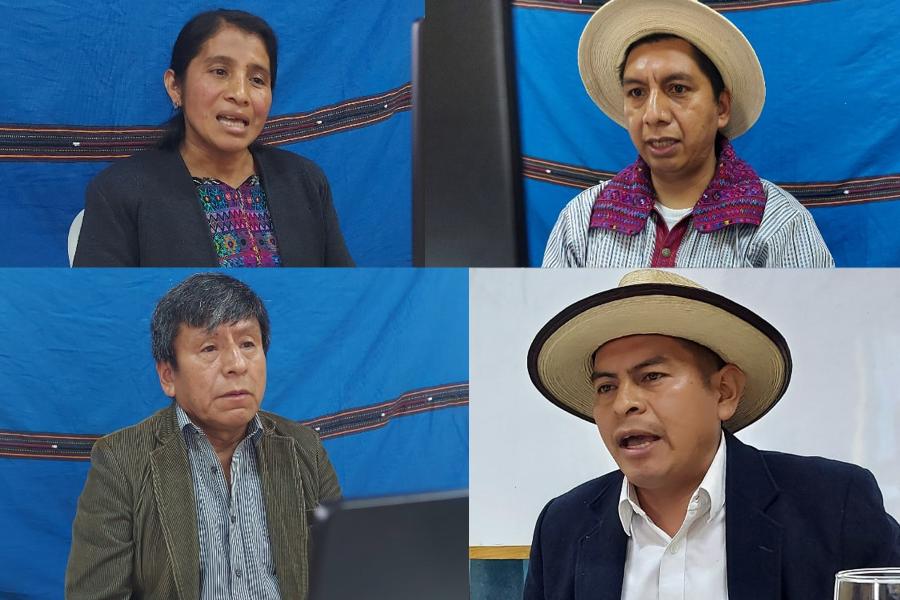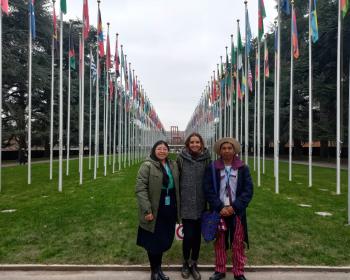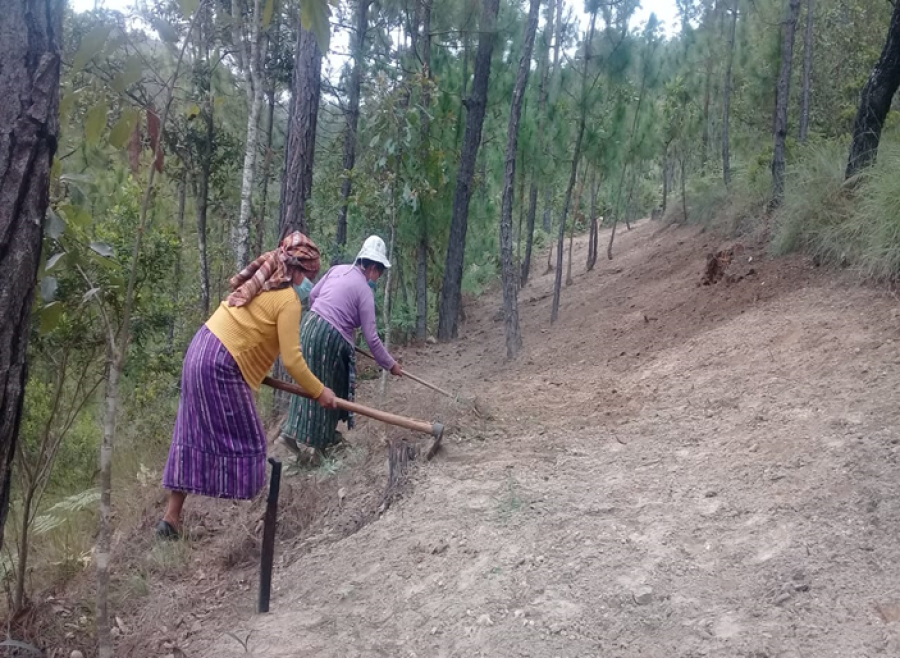With basic equipment, Guatemala’s Maya are using the radio to keep their communities informed and to strengthen a fragile democracy.
The upbeat notes of marimba music fill the air early on a February morning, emanating from households throughout the town of Concepción Chiqurichapa, Guatemala, who are listening to Radio Mujb’ ab’l yol. Between songs, the voice of a young disc jockey announces the community news in Mam, the local vernacular.
The radio operator is Juan, an eight-year-old boy. During the course of his broadcast, two teenage girls dressed in colorful huipiles enter the small room which houses the station. They have come to learn how to run their own program. Juan is their teacher.
More than 240 community radio stations like Mujb’ab’l yol broadcast daily in Guatemala in 23 indigenous languages, but the stations are barely tolerated by the national government. Community broadcasters’ right to use the radio frequencies is not explicitly guaranteed in Guatemalan law. The government claims that the “pirate” stations compete unfairly with the national commercial stations. But because community radio stations cover only a few square miles and have no national advertisers, it is difficult to comprehend the threat they pose to the mighty national commercial stations, all of which are based in Guatemala City and cater to non-indigenous ladino interests. Because the stations are the most effective means of disseminating information in rural areas, they are even used by the police and local governments.
Community radio stations play key roles in the development of democracy and peace in Guatemala. They often provide the only available source of news and information. Locally produced programming offers a forum for political, religious, and artistic expression. The regional and national associations of radio stations that have formed to lobby for the right to broadcast on the airwaves have brought together diverse elements of society to work toward a common goal.
Live from Concepción Chiquirichapa
As we drive up the valley in early April toward Concepción Chiqurichapa, we find Radio Mujb’ab’l yol on the FM dial and listen to a steady stream of ranchero music punctuated by low-cost anuncios, the 10-second paid announcements for everything from a local shoe store sale to a birthday party.
The Radio Mujb’ab’l yol building is easy to spot with a 10-meter-tall antenna on the roof. Apart from the antenna, the entire station is housed in a 10-foot-by-10-foot room divided by a wooden partition with a window. Juan sits at the broadcast booth behind the window, in command of the operation for the morning. He finishes a set of anuncios and loads another ranchero compact disc into the player before he runs across the street to find the station manager.
Before the song ends, the boy is back with the manager, who recounts the history of the station. Radio Mujb’ab’l yol began during Guatemala’s civil war as a guerilla radio station to broadcast information about the peace accords. At first the station broadcasted only political messages, but the mayor came to them with advice: “No one wants to listen to political rhetoric all the time. Play music.” The guerilla radio started to broadcast music most of the day with short political messages between songs. The station evolved over the years, and now daily programming includes segments about health, music, and the environment. The station once had a news hour, but it no longer has a source for daily news. When it did have news, station volunteers would travel to Xela by bus, go to an internet café, select news content from the web, and come back to Concepion Chicquirichapa to broadcast what they found. At a cost of a few dollars a day, this method was a budget buster. Now, a disc jockey sometimes reads news from a Guatemala City newspaper.
Empowerment Outage
Young and old, men and women, Catholic and Protestant, former guerillas and former army: all have use for the airwaves. Because they tend to broadcast in the local Mayan languages rather than only Spanish like most commercial stations, the most marginalized sectors of the population benefit from community radio. Youth, indigenous peoples, and women can voice their ideas and concerns.
The communities’ commitment to this medium is clear. All radio stations are run by volunteers, and many people have devoted their savings to opening a station. While some stations have received support from international organizations, a majority are supported by the small fees charged for broadcasting anuncios.
To date, legislative promises to set aside a certain amount of bandwidth for community radio have not been implemented. Since the Peace Accords, many community stations have requested a legal frequency for their broadcasts and have been denied. The government currently does not grant permission unless the station buys bandwidth at an auction for a sum of $28,000. This price is unachievable for community broadcasters, who earn an average of less than $80 per month. The stations that operate legally are all commercial and mostly foreign-owned. Three people dominate Guatemala’s media outlets. One, Remigio Angel Gonzales, a Mexican businessman who lives in Miami in the United States, owns the country's four main television stations and 25 commercial radio stations.
The only legal documents community stations have to back up their legitimacy are the Peace Accords; Article 35 of the Guatemalan Constitution, which secures the right to freedom of expression; articles regarding education and communication in the International Labor Organization Convention 169; and Article 19 of the Universal Declaration of Human Rights, which states that “Everyone has the right to freedom of opinion and expression; this right includes freedom to hold opinions without interference and to seek, receive, and impart information and ideas through any media and regardless of frontiers.”
In 2000, the stations came together and created five regional associations operating under a national umbrella organization called the Guatemalan Community Communications Council. The council is now campaigning for the passage of a proposed reform to the communications law that would reserve radio frequencies on national, regional, and local levels so that the regional associations can utilize them for community services. Since the council was formed, the government has stopped fining the community stations.
Democracy beings with democratizing media. Guatemala needs community radio stations in order to ensure that its fledgling peace and democracy take root.
Mark Camp is Cultural Survival’s director of operations. He worked in Guatemala from 1993-1998. Agnes Portalewska is Cultural Survival‘s membership coordinator. Both traveled to Guatemala this year to research opportunities for news and information sharing between Cultural Survival and indigenous community radio stations.



